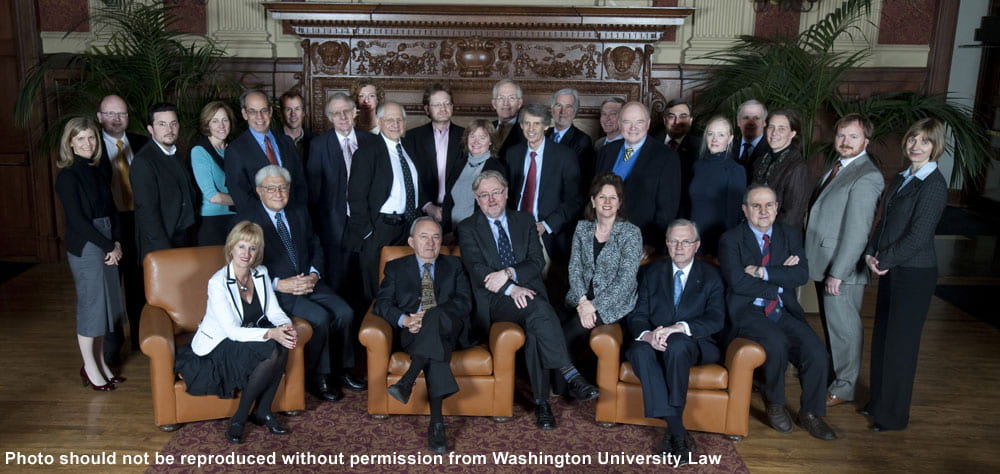A distinguished group of international law experts from around the world gathered at the law school on April 13-15 to begin work on a Specialized Convention on Crimes Against Humanity. Participants presented research on specific substantive and procedural aspects of the draft convention and debated related issues.
The meetings were part of a two-year project to study the international law regarding crimes against humanity and to draft a multilateral treaty condemning and prohibiting such crimes. The initiative, which is under the auspices of the law school’s Whitney R. Harris World Law Institute, is being funded in part by a leadership grant from alumnus Steven Cash Nickerson (JD’85, MBA’93) and by the United States Institute of Peace. Project co-sponsors include the American Branch of the International Law Association and the American Society of International Law.
“The first experts meeting of the Crimes Against Humanity Initiative was a great success,” said Leila Nadya Sadat, the Henry H. Oberschelp Professor of Law, Harris Institute director, and chair of the project Steering Committee. “Participants acknowledged the ineffectiveness of current international responses to the commission of atrocity crimes, and debated the difficult issues involved in creating a new legal instrument to address them.”
Steering Committee member M. Cherif Bassiouni, Distinguished Research Professor of Law and President Emeritus, International Human Rights Law Institute, DePaul University, added: “Those present were the senior experts on International Criminal Law in the United States, and many of them are world leaders on the subject of ICL and Human Rights. Their contributions were exceptional. The work that is being done on a Crimes Against Humanity Convention is truly of historic significance.”
Those participating on the April 13-15 panel included Professors Sadat and Bassiouni; Hans Corell, former United Nations Under-Secretary for Legal Affairs; Justice Richard Goldstone, former Justice of the South African Constitutional Court and former Chief Prosecutor of the International Criminal Tribunals for Rwanda and for the Former Yugoslavia; Juan Méndez, President of the International Center for Transitional Justice and former President of the Inter-American Commission for Human Rights; Professor William Schabas, Director of the Irish Centre for Human Rights of the National University of Ireland, Galway; and Judge Christine Van Den Wyngaert of the International Criminal Tribunal for the Former Yugoslavia.
The conference explored the problems of peace and justice, universal jurisdiction, the phenomenon of ethnic cleansing, interstate enforcement of treaty obligations, and the relationship of a new treaty to the International Criminal Court (ICC).
“The group reinforced its commitment to supporting the ICC regime, and felt that any new instrument would need to be supportive of the Court and its role in international justice,” Sadat said. “At the same time, all recognized that a serious impunity gap exists given that the ICC will address very few cases, and that crimes against humanity continue unabated around the world.”
Goldstone noted that while treaties exist to address genocide and war crimes – the Genocide Convention of 1948 and the Geneva Conventions of 1949 together with their Optional Protocols of 1977 – there is currently no treaty on “crimes against humanity.”
“This gap in the law was thrown into sharp relief in the recent decision of the International Court of Justice in the case between Bosnia and Serbia,” he noted. “The Court was restricted to claims of genocide, and crimes against humanity fell between the cracks. The Crimes Against Humanity project is designed to fill this important gap in international humanitarian law.”
Schabas agreed that the Crimes Against Humanity project addresses a significant gap in international law, namely the lack of an international treaty that sets out the obligations of States in terms of preventing and prosecuting crimes against humanity.
“Many obligations, such as the duty to cooperate in prosecution and extradition, and the responsibility to prevent the crime, are said to be enshrined in customary international law,” he said. “However, it is important to take such vague commitments a step further, and incorporate them in a binding treaty. The project brings together many of the world’s experts on this subject, who will craft a model treaty that can then be considered by governments.”
In addition to the meetings, Clint Williamson, Ambassador-at-Large for War Crimes Issues, and Whitney R. Harris, a philanthropist and Nuremberg prosecutor addressed the group.
A report of the April meeting and the Draft Convention will be circulated among the experts. The second meeting of the Crimes Against Humanity Initiative will take place at The Hague on June 11-12. The project will culminate with a global conference, at which the final draft of the multilateral treaty will be discussed and the problem of prevention, as well as punishment, will be taken up. Cambridge University Press will publish the papers commissioned by the project, a full draft of the treaty, and an accompanying commentary.
